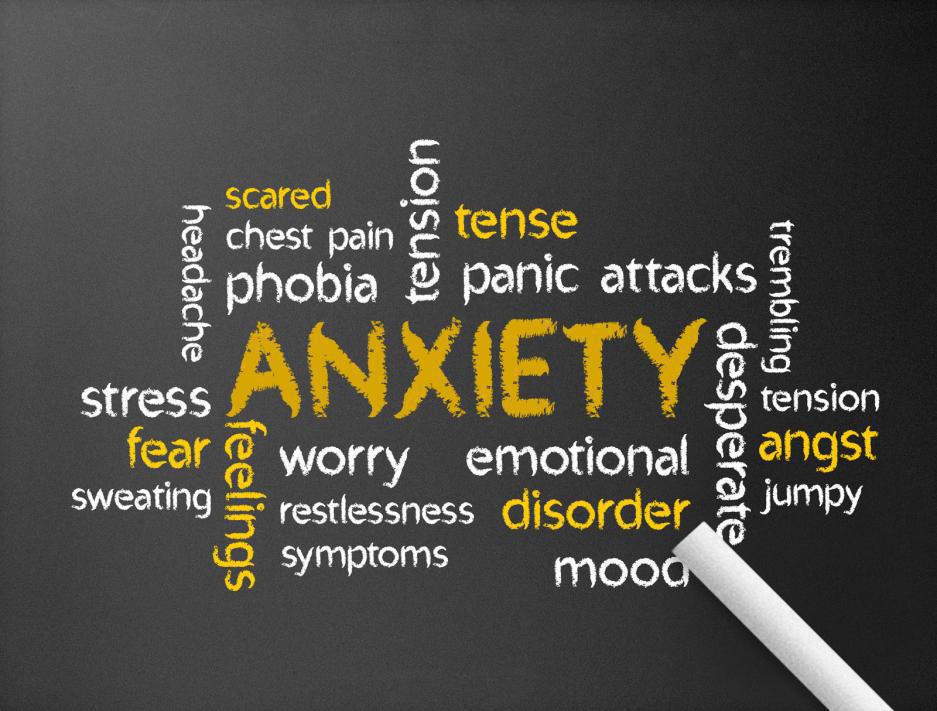What is Anxiety?
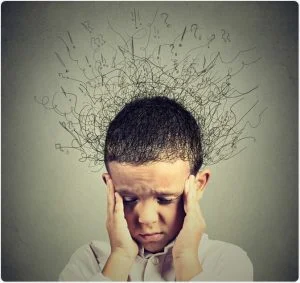
All of us experience anxiety in our day-to-day lives but when anxiety starts to interfere with different aspects of our daily life, it becomes an anxiety disorder. It is one of the most commonly found mental disorders in the world. And the numbers have only increased in the wake of covid-19. The uncertainty caused by the pandemic has worsened the symptoms of already existing anxiety patients in the world, as well as several new patients, have been reported. The biggest challenge is to learn the strategies of living with anxiety.
A study conducted on 10,000 Indians by a Delhi-based mental health service platform — The Center of Healing (TCOH), reported an increase in the number of people suffering from anxiety since the covid-19 pandemic. The study also revealed that 88% of Indians reported anxiety. There can be numerous reasons for the rise in anxiety disorder namely multiple lockdowns, salary and job cuts, fear for the health, etc.
Even mental health professionals and therapists are reporting an increase in mental stress due to the record number of cases they are receiving. And mental health experts are continuously emphasizing the fact that India is facing a mental health epidemic and the mental health crisis is another disaster just waiting to happen.
Difference Between Anxiety And Anxiety Disorders
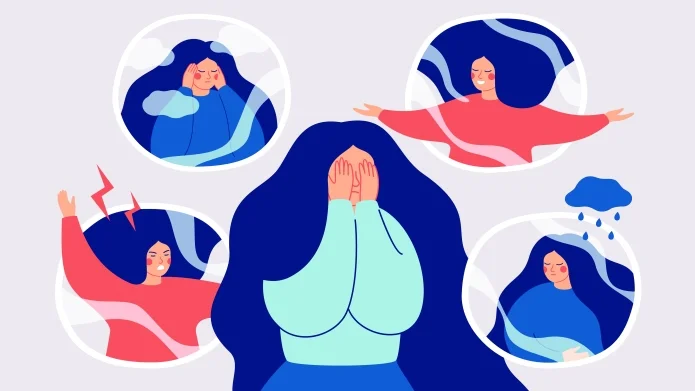
An overall understanding of the differences between the normal feeling anxiety and anxiety disorders can be crucial to get help to the individual requiring medical attention.
Anxiety about potentially life-threatening situations will help you in taking appropriate safety measures instinctively. A fair amount of anxiety before an exam or an interview is quite favorable as it can also improve your performance.
Feelings of anxiety are triggered when we sense a potentially dangerous or worrying situation. Physical symptoms like sweating, racing heart, etc. also come along with the feeling of anxiety. Since ancient times these symptoms work as alarms to make us cautious towards any potential danger in the environment thus helping in survival. Any perceived threat or danger sends signals to our brain to release the adrenaline hormone which is responsible for our ‘flight-or-fight’ response.
Anxiety disorders is an umbrella term for a group of mental health disorders that cause severe levels of stress and anxiety. Common symptoms may include, paralyzing fear of something being wrong with your loved one, your health, etc. Excessive anxiety can cause serious disruption in your daily life and can impair your ability to carry out your daily routine. It can also severely affect your mental health causing distress to you and also to people around you. It is seen that anxiety affects an individual’s productivity and relationships as well.
Symptoms That A Person Is Living With Anxiety
Each person can experience anxiety disorders differently but there are some common psychological and physical symptoms.
Psychological Symptoms
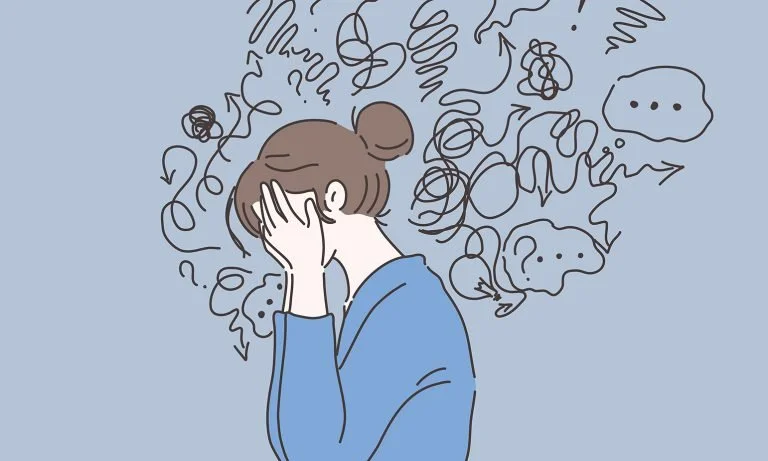
- Excessive worry: People who are suffering from chronic anxiety often find themselves worrying about several things. They tend to worry about future events, past behavior, and bad experiences in their lives. People who are constantly worrying about everyday life can feel overwhelmed or exhausted most of the time.
- Panic attacks: A panic attack is a sudden feeling of intense fear that comes without warning. It can leave you feeling very strong physical reactions. People who suffer from panic attacks feel like they can’t breathe, can’t think clearly, and often believe that they are either dying or going crazy. If someone has a panic attack, it is best to call for help.
- Replaying anxious thoughts: People with anxiety disorders often replay past events or conversations in their heads. This causes the person to feel more anxious because they are constantly thinking about the past.
- Overly self-critical: When people have chronic anxiety, their thoughts often turn to themselves. They start to criticize themselves. They end up thinking that they will never be happy or healthy again, or that something bad is about to happen. This cycle of negative thoughts and emotions can be detrimental to a person’s mental well-being.
- Overthinking negative scenarios over and over: The person who is suffering from chronic anxiety often finds themselves envisioning negative situations over and over again. These thoughts can make them feel very anxious or depressed.
- Extreme distress: People who are struggling with chronic anxiety can feel very distressed. They will display symptoms such as agitation, restlessness, and feeling overwhelmed.
- Intrusive thoughts: The person suffering from chronic anxiety often has intrusive thoughts that cause them to feel very anxious. This is when they constantly re-play certain thoughts or memories in their head. People who are experiencing these types of thoughts should surround themselves with people who love and care for them.
- Agitation: A person with chronic anxiety will often feel agitated. They might find it difficult to sit still and may repeatedly fidget, pace back and forth, or wring their hands.
- Restlessness: People struggling with chronic anxiety often find it difficult to sit still. They might pace back and forth, wringing their hands, or constantly feel like they need to use the bathroom.
- Derealization and depersonalization: Derealization is the feeling that things around you are not real. Depersonalization is when you feel disconnected from yourself. These types of symptoms can have a serious impact on your life, making it difficult to interact with people or do your job or schoolwork.
- Fear of losing control: People with anxiety disorders often fear losing control. They might feel like they are going crazy or that something bad is happening and they can’t stop it. This can be a very frightening and overwhelming feeling, especially if the person feels like there is no one to turn to.
- Procrastination: People with anxiety disorders often find it difficult to make decisions and start tasks. They might avoid doing certain things, which can cause problems at home or school.
Physical Symptoms
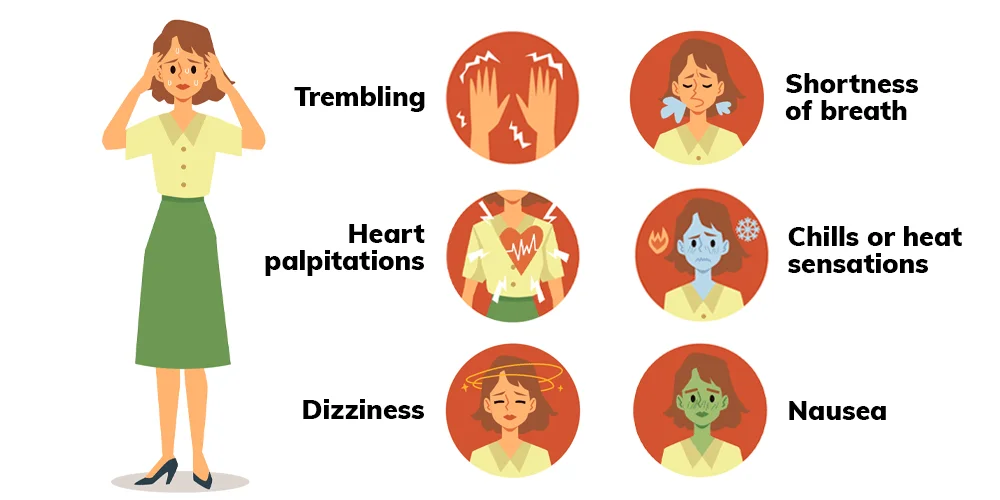
- Hyperventilation: When people have anxiety, they might breathe too quickly or too deeply. They might have a feeling of being suffocated. This hyperventilation causes the person to take up too much oxygen. This can lead to chest pain and dizziness.
- Lightheadedness: Inability to breathe properly can also cause lightheadedness and weakness in limbs. People who have anxiety also generally have cold hands and feet.
- Palpitations: The heart beats rapidly, or palpitates, because of the state of over-arousal.
- Tremors: Persons with anxiety present trembling in hands and legs if they are still anxious after taking medication. This presents itself as an uncontrollable force that shakes one’s hands or body.
- Changes in appetite: A person with anxiety may experience loss of appetite, nausea, digestive disturbances.
- Diarrhea: Some people have irritable bowel syndrome due to anxiety.
- Irritability: Persons suffering from an anxiety disorder are often irritable.
- Sweating: When a person is anxious or afraid, they sweat. This sweating can be profuse in some instances. The sweating may increase markedly when the anxiety increases, for example during an episode of panic.
- Muscle twitching: The muscles of a person with anxiety may twitch. This is often the result of hyperarousal and irrational fear, as well as attempting to deal with stress.
- Headaches: These typically occur due to muscular tension and an imbalance in certain neurotransmitters (such as serotonin).
- Dry mouth: Anxiety can cause a person’s mouth to go dry.
- Bad breath: This is often due to the excess saliva that was produced in your mouth for use when you are anxious or under stress, not being swallowed.
- Nausea: A feeling of nausea is common in people who have anxiety disorders. The stomach feels upset and churning may occur. This may be because you produce more saliva when you are anxious or stressed. Saliva is meant to help you, but if you don’t swallow it, it will just come out again.
- Tingling sensations: A sense of tingling sensations on the skin is common in people who have anxiety. This happens when your body’s fight or flight system is activated, usually when you are experiencing anxiety symptoms.
- Choking sensation: You may feel as though you are choking or having difficulty swallowing. This happens to people who have anxiety when they are anxious about something, but it also can happen during an anxiety attack.
- Disturbed sleep patterns: Anxiety can cause you to wake up frequently during the night and be unable to get back to sleep easily. You might also simply not feel like sleeping at all.
- Tightness in the chest: This is part of the physical symptoms many people experience when they are anxious.
- Body aches: These can include aches and pains in various parts of the body that happen because of muscular tension and stress on the body.
- Frequent urination: Anxiety can cause a person to have to urinate more often than the average person.
Types Of Anxiety Disorders
Generalized Anxiety Disorder
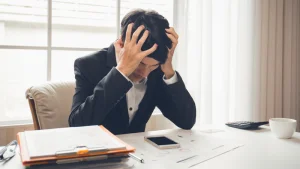
Generalized anxiety disorder or GAD is one of the anxiety disorders. People who suffer from this anxiety disorder display symptoms like exaggerated and persistent worry. Physical symptoms like sweating, heart palpitations, hyperventilation and gastrointestinal problems like constipation, etc. GAD may not be accompanied by symptoms like panic attacks. Worrying in a situation of potential harm or danger is a common human response but when the worrying becomes persistent and disproportionate from the actual threat present, it may be GAD.
Social Anxiety
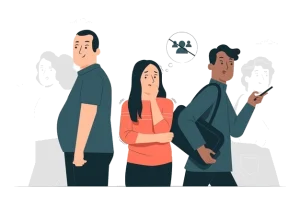
Excessive fear of social situations is the main symptom of this condition usually accompanied by overwhelming stress. This anxiety disorder is also known as social phobia. Individuals with this mental disorder mainly worry about embarrassing themselves in public. People with this disorder tend to avoid any social interaction altogether to cope with the intense stress and anxiety.
Panic Disorder

Panic attacks are the key symptoms of this anxiety disorder. You may feel intense fear accompanied by physical reactions even when there is no threat present. These attacks can occur suddenly, without any warning and you may feel like having a heart attack or even dying. Although panic attacks can cause significant distress they are not specifically life-threatening. You may experience fear of losing control, dizziness, chest pain, etc. while having a panic attack.
Specific Phobia

Phobias are classified by intense and irrational fear. Unlike GAD phobia is often related to a specific situation or object. It often leads to avoidance of specific triggers altogether. People suffering from this anxiety disorder are often aware of their condition. Some of the most common phobias are namely; acrophobia – fear of heights, claustrophobia – fear of enclosed spaces, aerophobia – fear of flying, hydrophobic – fear of water, etc.
Selective Mutism
Selective Mutism is considered a severe anxiety disorder. Its onset usually occurs in childhood and the symptoms can also persist in adulthood. It is a condition where a person who can otherwise speak, shows an inability towards speaking and communication in selective, anxiety-inducing situations.
Separation Anxiety
Separation anxiety can not only be experienced by children but also adults. Excessive worry and fear of losing or staying away from a loved one is the major symptom of this particular anxiety disorder. People can develop separation anxiety either in childhood or adulthood. Individuals suffering from this specific disorder can also manifest physical symptoms such as nausea, headaches, sore throat, etc.
Agoraphobia
Fear of people, places, or situations that may cause feelings of embarrassment and helplessness is called agoraphobia. If someone is experiencing agoraphobia they may feel distressed in using public transportation, being at open or enclosed places, being at crowded places. They may also experience sudden panic attacks which often lead to complete isolation to avoid potential triggers.
Obsessive-Compulsive Disorder
In popular culture, obsessive-compulsive disorder or OCD is often thrown away lightly when someone likes cleaning or folding their clothes neatly. But OCD can be very distressing in real life. Because a person suffering from this anxiety disorder does not clean just because he likes to clean instead he may feel intense anxiety if he doesn’t take part in the compulsions. Intrusive thoughts are also a key symptom of this disorder. These repetitive thoughts usually have a theme varying from person to person.
Post-traumatic Stress Disorder
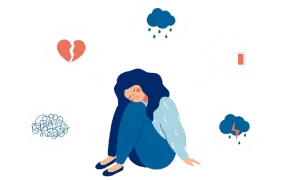
This mental health condition is known to be triggered after experiencing or witnessing one or more terrifying events. It causes extreme anxiety, flashbacks, and dreadful nightmares. The person who is suffering from this anxiety disorder stays hyper-vigilant because according to him danger is lurking around every corner of the world. Usually, military personnel, victims of sexual or physical violence, and people who are dealing with the trauma of losing a loved one, war or natural disasters can experience PTSD. The severity of symptoms may vary from person to person. People with this anxiety disorder continue to relive the terrifying event through flashbacks and nightmares. They also start to avoid the places and people that may remind them of the traumatic incident often leading them into isolation.
Living With Anxiety Disorders
Medication

Several types of medications can be used to treat someone with anxiety disorders. Antidepressants and benzodiazepines are the mainly used drugs to lower anxiety levels. But always take a prescription from the doctor before starting any medicine. As you can become dependent on some of them and it will only lead to more harm than good.
Exposure and response prevention therapy
Exposure and response prevention therapy or ERP includes gradual desensitization of your fears. It involves encouraging individuals to face their ultimate fears in a safe environment systematically. ERP is a highly effective and research-based therapeutic technique that is currently used by several mental health professionals in many countries around the world. In recent times, it particularly treats specific phobias, obsessive-compulsive disorder, and other anxiety disorders, successfully.
Cognitive Behavioural Therapy
Usually known as talk therapy, CBT is a very effective type of psychotherapy. You can visit a trained mental health professional who is qualified to perform CBT. In a therapy session, the trained professional actively listens to your problems in a non-judgemental and empathetic manner and also recommends different ways to manage your anxiety and concerns. CBT focuses on replacing a person’s negative thoughts with more positive and realistic ones in orange problematic behavior.
Self Care
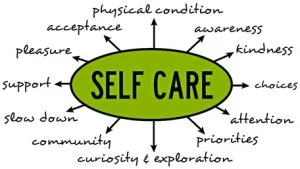
Indulging into a self-care routine can have a calming effect on your anxiety. A relaxing self-care activity can lower your stress and rejuvenate you from within. It is important to learn a few tips and tricks to calm your anxiety as medicine doesn’t have to be your only option. Identifying your triggers, getting proper sleep, cutting down caffeine, digital detox, decluttering, meditation, and eating a healthy diet are also forms of self-care activities. You can also develop healthy coping strategies to keep the anxiety at bay.
Self Management Strategies For Living With Anxiety
Relaxation and mindfulness techniques
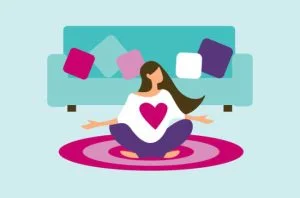
In order to feel relaxed, you need to be able to switch your brain off from the constant thinking it does. This can be a hard task if you have OCD or Panic attacks where high levels of anxiety are present all the time. It’s important to try and switch off but if it’s not possible, you can still learn how to have a good quality of life despite the anxiety being there.
Get some sunshine
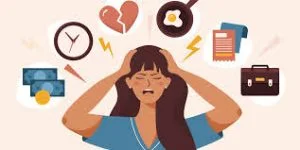
This is an often overlooked aspect of anxiety. The sun gives us vitamin D which you don’t get enough of if you are stuck inside all day long. Vitamin D can be directly linked to mental health. A lack of vitamin D can cause depression and anxiety, so some sunshine will do wonders for you!
Build strong relationships

Surround yourself with people that lift you up and don’t bring you down. If your friends or family are making you unhappy, try to explain this to them in a gentle way. If they don’t change their behavior, it might be time to distance themselves from them. However, if not, consider spending less time around them while trying to improve on your own.
Exercise
Not only will exercise release serotonin in your brain, but it will also improve the blood flow to your muscles which makes you feel good. It also brings along many other benefits. For example, after some time of exercising regularly, you will be able to sleep better.
Talk to others

As mentioned before, building relationships is important. If you don’t have anyone to talk to about what is going on right now, try an online forum. There are people that can listen there. There are many communities out there for people with similar issues where they offer support and advice. Talking about what you’re going through can help you feel better. It can be a release to talk to someone about it. You can work through your problems in a healthy way.
Take some time for yourself
When we suffer from anxiety, we tend to neglect ourselves, but that’s the worst thing you could do! Take 1-2 hours a day just for yourself. Watch your favorite TV show, eat some delicious food… whatever you want! By doing this, we can improve our mental health and slowly work on self-care.
Learn how to manage stress
In order for this to work, you need to find out what is causing these high levels of anxiety and stress and change them. For example, if your job is giving you a hard time, you might want to consider changing it. If your relationships are a source of anxiety, try and mend them. If you have financial troubles, deal with it in a calm way and speak to someone about it if you can’t do it alone.
Breathe
Take deep breaths when you notice the symptoms of your anxiety. This will calm your body down and show you that you can control it if needed. It’s a simple and effective technique.
Get organized
A cluttered house can cause stress and anxiety. If your home is chaotic, try to take some time to clean it up. This will make you feel better and relaxed after the hard work! It will also make you more productive which will give you a sense of achievement.
Journaling
Writing in a journal can help us understand our problems and work through them. It’s also another form of self-care and many people find it therapeutic. If you aren’t that into writing, try expressing yourself by drawing or painting!
Positive self-talk

When we’re struggling with anxiety, it’s easy to think negative thoughts. Try not to fall into this trap. Remind yourself of your qualities and all the things you’ve achieved so far! This should boost your self-esteem and hopefully reduce any feelings of anxiety. Over time, it will become easier for you to think positive thoughts about yourself.
Join a support group
If you don’t want to be alone, you can join a group of people who have the same mental illness as you. It’s also proven to reduce stress and anxiety levels which is great news! These groups also provide you with moral support and often give useful advice. You can find them online or your local hospital might even have one.
Get enough sleep
Aim to get at least 7-9 hours of sleep a night. If you’re getting less than this, it could be causing your anxiety levels to rise. Lack of sleep can increase anxiety and its symptoms of it. If you’re struggling with sleep, try to work it out. For example, avoid caffeine before bed and only use your bedroom for sleeping.
Manage your thoughts
When we suffer from anxiety, it can be easy to let negative thoughts take over. If you notice yourself thinking negatively about yourself, snap out of it! Remind yourself that what you’re feeling is just how your body reacts to anxiety and that these feelings will pass. Don’t let them control you!
Create a to-do list
If you’re someone who gets anxious about not being productive, try creating a to-do list. You can even split it into small tasks that will only take around 10 minutes. Sometimes just getting started is the hardest part! Make sure to give yourself time for breaks too so you don’t burn out.
Take care of your body
A healthy body leads to a healthy mind so it’s vital that you eat healthily and exercise. Try some yoga or tai-chi for some relaxing sessions. If these activities aren’t your thing, try going for a walk every day. It will greatly boost your mood! You can also listen to some music or take some time out to read.
Try to use aromatherapy
Add some drops of lavender oil to your bath or diffuse them in your bedroom. This is a great way to help you relax and ease any tension. If you don’t like the smell, try eucalyptus or sandalwood instead! You can also use these oils for meditation which might be even more calming.
Helping Someone Who Is Living With Anxiety

It is hard to deal with anxiety. If you have other people who are there with you, it can be even harder. Families, friends, and partners can all play a role in helping you manage your anxiety. An article says that people who have a mental illness can be helped. And if you have a mental illness, it is important to be supportive of yourself.
People with anxiety problems often feel ashamed, guilty, and embarrassed about their condition. They may feel they need to hide their symptoms from others in order to prevent this discomfort. You can tell people about your anxiety. When you tell people about it, they can help.
In order for others to understand and support you, you have to let them know what your anxiety is doing to you. They can’t read our minds, so we have to take the risk of being vulnerable and ask them for help.
There are many people with anxiety problems. Talking about it helps. It can break down stigmas and stereotypes. We need to tell our own stories too. We’re all in this together. We can help each other recover from anxiety. It will be hard, but we can do it together.
Conclusion
Living with anxiety is one of the hardest things. It can be hard to live in a world that is so unpredictable and overwhelming, but it feels even worse when you have something else telling you how much stress there should or shouldn’t be. But if we take these feelings seriously- which are our brain’s way of trying to protect us -we can learn from them and start treating ourselves better by taking care of our physical health, mental well-being, social connections, etc. We’ll also find less time for worry because we’re too busy living life! So here are some thoughts on what might help someone who struggles with high levels of worry feel just a little bit better about themselves.
A Word From Therapy Mantra
Your mental health — Your psychological, emotional, and social well-being — has an impact on every aspect of your life. Positive mental health essentially allows you to effectively deal with life’s everyday challenges.
At TherapyMantra, we have a team of therapists who provide affordable online therapy to assist you with issues such as depression, anxiety, stress, workplace Issues, addiction, relationship, OCD, LGBTQ, and PTSD. You can book a free therapy or download our free Android or iOS app.
